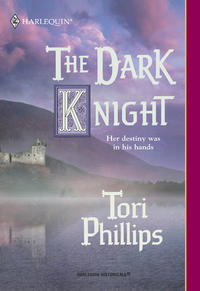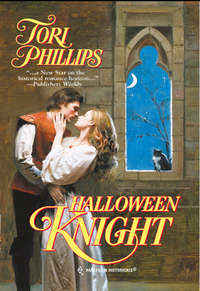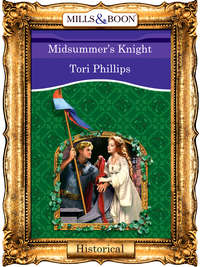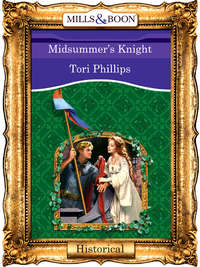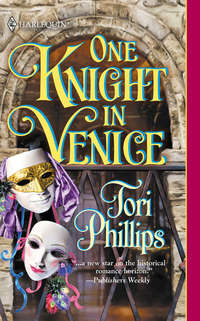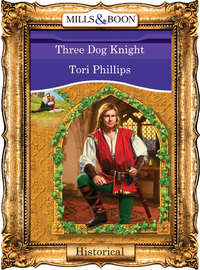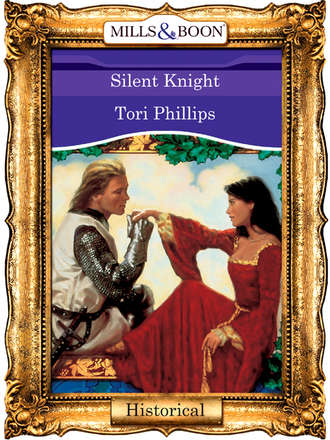
Полная версия
Silent Knight
In answer, Guy took out his slate and quickly wrote upon it. He passed his message to Celeste,
Probably can’t read, spelled the blurry chalk letters.
Her eyes darkened into twin purple storm clouds. “But if the innkeeper is unlettered, who will speak to him?”
She looked adorable, standing in the middle of the bustling yard, clutching her worn leather bag with such a perplexed look on her upturned face. Guy almost smiled at her, but caught himself in time. Hardening his features, he gravely pointed to her.
“Moi?” she squeaked, her eyes widening at the prospect. “But my English is so... so barbaric.”
Guy wiped the slate with his sleeve, then wrote Good practice for you.
“Fah!” she snorted. Guy remained unmoved. “well, if it is to be, then let us confront this English lion in his den. At least, it looks to be a clean den.” Turning on her heel, she marched smartly to the door of the taproom, with Guy and Gaston following close behind.
“Such fire, that little one!” Gaston chuckled. “Let us hope her new husband is not a milksop, or she will reduce him to pudding.”
Guy gnashed his teeth at the thought. Walter Ormond was no whey-faced boy. Nor would he be ruled by anyone—certainly not a sweet maid with a poor command of the English language. Guy reminded himself once again that her future married life was none of his concern. Why not? that annoying little voice asked him as he pushed his way through the door of the boisterous Feathers.
Unerringly, Celeste singled out the master of the establishment. “Pardon, monsieur.” Taking a deep breath before continuing, she ran her tongue over her lips, which immediately gained her the innkeeper’s appreciative attention.
“We want room for the night, yes?” Celeste smiled coquettishly at the ruddy-faced man and fluttered her lashes.
Hooding his eyes, Guy observed her. The little vixen might be young, but she knew enough tricks to befuddle a man’s wits.
The innkeeper appraised her with a shrewd glance. “Frenchies, by the look of ye.”
Celeste drew herself up to her full height, which put her at chin level with the man. “Oui, but we pay in the English silver.” She flashed him a brilliant smile, then nodded toward Guy. “And the goood brother ’ere is English and understands all you say.”
Stepping forward at this introduction, Guy loomed over the host. Taking in the monk’s height and shoulder width, the innkeeper stepped back a pace.
“Begging yer pardon, Friar, but we had a wee bit o’ trouble with the frogs afore, and a man can’t be too trust in’ with any o’ that lot.”
Before Guy could react, Celeste erupted with a sputter of French, followed by an equal torrent of English. “Frog? Mon Dieu! ’E says I am the frog?” A delightful blush of pink crept into her cheeks. “Bah! Imbécile! Am I green? Do I ’ave the face of the frog? Look you!”
Lifting the hem of her gown, she displayed a slim ankle and the lower portion of a shapely calf, encased in a bright yellow silk stocking. “Is this the leg of a frog?”
The landlord whistled through his gapped teeth at the unexpected sight, while the nearby patrons of the taproom craned their necks for a better view. Glowering, Gaston tugged at her hand.
“Lady Celeste! Drop your skirt!,” he muttered in rapid French. “What do you want these pigs to think you area woman of no reputation? Marguerite de la Columbiaire would have my brains served for a dog’s breakfast if she knew what you were doing.”
“My aunt will never know, Gaston,” Celeste whispered back to him, though she immediately let go of the velvet burgundy skirts.
Guy stepped closer to her and sent a scorching look at the jostling assembly. Jesu!, This was only the first night! He would be lucky to get her to Snape Castle in one piece, at this rate. And why did she have to possess such a fine leg? He promised himself he would sleep without bedding tonight in penance for the pleasure he took in the revelation of that dainty part of her.
Celeste smoothed her skirts, then cocked her head at the innkeeper. “Now, monsieur, do I ’ave the room?” Smiling, she fluttered her lashes again. “The best in the ’ouse, oui?”
“My pleasure, m’lady,” he all but slobbered.
“I also ’ave men, ’orses, and the wagon?” Her smile became broader.
“The stable lad will see to them. ’Tis a shilling a horse.”
Celeste looked to Guy for approval.
Glaring at the landlord, the monk shook his head. The man was nothing less than a highway brigand. Guy held up four fingers, then all ten.
“Ah, the good Brother Guy say three shillings for all our ’orses, and my men-at-arms—weeth supper, oui? ’E is a man of God, monsieur, and is très ’onest.”
Repressing a smile at her bargaining skills, Guy nodded in agreement. The landlord glanced at the giant monk, then to the grim-faced sergeant, and finally to the dimpled lady. He threw up his hands in resignation.
“I’ll be a-standing in line at the dole hatch yet, and no mistake, but seein’ that ye’ve men-at-arms, I trust ye to be a lady of—” He flushed and glanced at the hem of her gown, which now primly concealed the yellow silken leg. “Of quality. ’Tis me best room, at your service. Second floor, at the end of the hall.”
Celeste produced a groat from her reticule, which hung from her waist. Taking the landlord’s beefy hand in both of hers, she pressed the coin into his palm. “Merci, monsieur. And there will be ’ot water and a fire and supper, all in an instant, oui?”
“Oui,” the man gasped, not even noticing the size of the tip he grasped. Several of the onlookers thumped their wooden cups on the oaken table with noisy good humor.
“Lady Celeste, a wise soldier knows when it is time to withdraw. That time is now.” Gaston looked to Guy, who nodded his agreement.
Good for you, Gaston! Get her out of sight before she stirs up too much unwelcome interest. Slipping his hand under Celeste’s elbow, Guy guided her firmly toward the stairs. As they ascended, her smothered giggles surprised him.
“I did well, non?”
Guy looked straight ahead, though he curled his fingers tighter around her arm. He strove to ignore what his practiced touch told him lay inside the velvet sleeve. She felt warm and soft, yet a current of wildfire coursed through her being—a promise of passion that would set a man’s soul blazing. Jesu! He must kneel half the night in solemn prayer for harboring such tempting sweet thoughts.
The room proved to be surprisingly well appointed. Firewood lay stacked on the hearthstone, waiting to be laid. A tinderbox promised relief from the chill night air. A stout table and two plain chairs sat before the fireplace. Celeste gave a small chirp of pleasure when she spied the large canopied bed in one corner.
“C’est bon!” she pronounced as she prodded the coverlet. “Clean linen, and the mattress feels as if it has been newly stuffed.” Leaning over, she investigated the underside. “New roping, and the chamber pot is clean. This landlord keeps a good inn.”
Without further ado, she began to push the saddlebag under a corner of the mattress. Guy glanced at Gaston, his brows raised in surprised query.
“Lady Celeste’s dowry, good Brother.” Gaston knelt at the fireplace and began to lay several of the split logs on the iron dogs.
A thick piece of ice felt lodged in the back of Guy’s throat. By all the devils in hell, was the silly creature carrying a large bag of gold as if it were a change of stockings? What could her father have been thinking, to send her off with only a few men and such a fortune? And why wasn’t Gaston more concerned? Guy shot a fierce look at the sergeant’s back.
Celeste’s honeyed laughter rippled over him. “Oh, la, la, Gaston! If you could see what a fearful face our good Brother Guy just made!”
His glare at her only provoked more laughter.
“Hey-ho, mon frère! Now what have I done to so displease you? In truth, I have said all my penance, and I do not laugh at your... that is, at you again.”
Guy pointed at the saddlebag, which poked out from under the covering. Celeste arched one sable brow.
“My dowry? But surely you expected that I would have it with me.” Her lips pursed together into a delectable pout, though her eyes twinkled.
Such kissable lips! Guy caught himself wondering if any young nobleman of France had savored the sweetness of those lips. Frowning more to himself than to Celeste, he snapped his fingers, then pointed to the bag.
“You wish to see my dowry?” Celeste cocked her head. Gaston regarded Guy with a thoughtful expression.
“Let him see what you carry, my lady,” the old soldier suggested softly. “Since we have been given into his charge, he should know all. As you said, he is a man of God, and honest.” Gaston unsheathed his dagger, studying its keen edge as if he had never seen it before.
Celeste shrugged, then pulled the bag out from under the mattress. “D’accord. I agree.” She plopped it on the table, then slid it toward Guy. “I fear it is not the treasure of the Eastern kings.” While Guy fumbled with the buckle, she strolled to the window.
After opening the flap, Guy withdrew a blue leather box; neither its flatness nor its light weight denoted a chest of coins. Lifting the lid, he frowned at the contents with some confusion.
“Oui, good Brother,” Gaston remarked, in the same soft tone, though Guy detected a note of danger beneath it. “You see before you the worth my master has placed upon his youngest daughter.” The sergeant spat into the fire, causing it to hiss as if a small serpent lurked within the flames.
Though her back was to him, Guy saw Celeste stiffen.
Nestled on a bed of ivory satin were twelve silver apostle spoons, the tiny figures of the saints on the handles shining with a thin gilt wash. Picking up one, Guy recognized Saint James the Greater by the minute pilgrim’s staff clutched in his right hand. A pilgrim’s hat hung down his back, and a tiny dove, no bigger than a pin’s head, sat on the saint’s halo. From the nicks and scratches in the bowl of the spoon, Guy deduced that the set was not only old, but well-used. Though the silver appeared of good quality, he knew the collection was not an appropriate dowry for a French noblewoman. Holding out the spoon to Gaston, he questioned the old soldier with a lift of his brows.
“A christening present, I heard.” Gaston’s lip curled down. “And an old one, at that.”
Guy shoved his hand deeper into the saddlebag. Surely there must be something else besides this. A deed to a French estate, perhaps? Gaston chuckled without mirth.
“By the beard of Beelzebub, that’s the whole of it.” He spat again into the fire.
With her back still to him, Celeste spoke from her position by the window. “I have four older sisters, Brother Guy. They...” Her voice wavered for a split second. She cleared her throat, then continued in a stronger tone. “They made brilliant matches with some of the finest families in all of France. Their marriage contracts cost my father much more than anticipated. Then, when it seemed almost too late, my little brother, Philippe, was born. After that...” She turned around, her deep purple eyes piercing the distance between them.
“My father wished to protect the rest of the estate for his only heir. It is understandable. But I was still unspoken for. Then your King Henry came to Calais to meet with our King François at the Field of Cloth of Gold.”
Guy heard the note of awe in her voice. He, too, remembered that fortnight—or, at least, some of it. He had been a reckless twenty-year-old then, and eager to win his spurs in the tournaments. His angelic good looks, as well as his prowess with lance, sword and bow, had won him many prizes and far too much acclaim. The adulation had gone to his head as quickly as the good burgundy wines that flowed from the many fountains set up amid the colorful silken tents.
The ladies of both camps had made much of the tall young courtier from England. He had passed every night in the giggling company of the fair sex, who offered their own prizes in a much more intimate sport. Maids and matrons alike—not one of them had resisted when he wooed. Not one of them had pleaded honor, virtue or fidelity as he untied the laces of their shifts. Guy blinked to erase his lusty youth from his memory. That was behind him now—worth less than the trampled grass of that French meadow where kings had once played and strutted like peacocks.
Celeste stared into the fire, and its glow sparkled in the depths of her eyes. “Such a sight it was, Brother Guy! The world has never seen the like of that fairy-tale city of tents. By the time we returned home, I was betrothed to Walter Ormond, the son of an English lord.”
“English!” Gaston spat out the word like a curse.
“This midsummer, I passed my eighteenth birthday and, as agreed between my father and Sir Roger Ormond, I have journeyed here to wed my English lord. But...” She cast a long look at the spoon, which Guy still held between his fingers. “My father could not spare much for my dowry. There is Philippe, you see....”
She plucked another spoon from its satin nest and twirled it in the firelight. Guy saw that it was Saint Mark, with his open book and a small lion crouched at his feet. “They are quite pretty, n’est-ce pas? And the workmanship is fine.” She carefully replaced it among its fellows. “When Sir Roger meets me and sees what a good wife I will make his son, he will not mind too much if my dowry is small, do you think?” She looked at Guy, with hope coloring her expression.
His heart slammed against his chest. Sir Roger would have to be blind not to see what a pearl of great price the chevalier of Fauconbourg had thrown at the Englishman’s feet. But Guy knew the senior Ormond well enough. Clarity of sight was not one of the old man’s stronger points. The lord would be livid when Celeste finally arrived at Snape Castle and presented this paltry box to him. And was Walter counting on French golden ecus to buy him back into King Henry’s good graces? Would he take out his disappointment on the flesh of this sweet angel?
“While I do not have a wealth of gold in my bag, good Brother, I count my virtue, my loyalty and my honor as precious as jewels. Sir Roger is a good man, I am sure. Were I to arrive at his threshold in only my shift, with my spoons, he would still greet me as a worthy bride for his son. I know it, for is he not a knight, and so bound by the laws of chivalry?”
Guy tore his gaze from the depths of her eyes, his mouth working in silent protest. Your father is a bastard! he wanted to cry out to the sooty beams above their heads. And Sir Roger was no gentle knight of a romantic tale, but a grasping, thieving, murdering half savage who lived by his sword in the wilds of Northumberland.
No, sweet Lissa, Roger Ormond and his wastrel son will melt your little spoons for the few coins they will make and, after Walter has finished using your soft body for his perverted pleasures, he will toss you and your fine ideals into the mud with the slops.
Chapter Seven
The cold wind from the North Sea whined around the stone corners and through the chinks of Snape Castle’s dank chapel. His face as chill and unmoving as the walls surrounding him, Sir Roger Ormond watched the flames of thick beeswax candles flicker above the casket of his second wife as an age-bent priest muttered through the poetic sequence passages of the mass of the dead.
“Liber scriptus proferetur, in quo totum continetur, unde mundus judicetur,” he intoned in a reedy, nasal voice. Then shall written book be brought, showing every deed and thought; from which judgment will be sought.
Roger’s lip twitched. His one good eye stared at the rough-hewn wood that concealed the body of his wife. What thoughts had ever lingered in Edith’s goosedown brain? he wondered. The woman had barely ever whispered more than two sentences together. When she stood before the throne of God, what judgment could he render to such a coney rabbit as her? What deeds had she done, either good or bad, during the three-and-twenty years she had lived upon this earth, except to hover in the shadows and whimper when Roger visited her bed? Aye, the wench had been a ghost long before she died.
But the children... His eye moved from the larger coffin to the two smaller ones next to it. Somewhere deep inside him, a stinging pain thumped against his heart, as if a lute string, too tightly wound, had snapped, recoiling painfully upon the musician’s fingers. Edward, nearly five, and his sister, little Edith. Their mother accompanied her children in death. Roger sighed softly. Was it only two days ago they had clambered upon his knee, begging for the spiced wine-dipped sops from his trencher? How like little birdlings they had been, so rosy and bright, as they gobbled the dripping treats from his fingers!
Then had come the headaches: first the boy, then little Edith, and afterward, in the gloaming, their mother had pressed her temple against the cold stone of the stairwell and sworn she could not climb the curving steps. The children had cried that the hall spun about them like a whirligig, and Roger had seen their eyes grow too bright by the devil-dancing fire on the hearth. Roger had ordered them carried up to bed, the three tucked in together. In less than an hour, their bodies had poured forth a stinking sweat. Little Edith had raved that she saw a small boy, all clothed in gold, standing by the door, beckoning to her. Edward had moaned that his head was bursting. Their mother had said nothing, merely whispered the name “Jesu.”
Then, at the turn of the hourglass, the three had breathed as one and then were gone. The nurse, a superstitious old fool from the Border country, swore she had seen their spirits arise from the soaking bed and fly out the high arched window—the baby in her mother’s arms and Edward laughing and skipping before them.
Riders from York had warned Roger that the dread sweating sickness had stalked the cobbled streets of that fair city since late August, but he had ignored them. Even when he heard that the king’s paramour, Anne Boleyn, had been taken ill, Roger had shrugged off the news as only a tidbit of court gossip. There had never been an outbreak of that strange illness at Snape Castle, not even the year before, when so many in the southern shires had died. Suddenly, within the space of a week, Roger had lost a number of peasants who tilled the home fields, then some of the household in the laundry and pantry, then a groom, a gardener, and, last of all, death had reached out his bony hand and dared to take Roger’s own.
So merry at dinner the children had been; so very dead by that evening’s doleful supper.
“Judex ergo, cum sedebit, quidquid latet, apparebit. ..” The priest droned on. Before the Judge enthroned, shall each hidden sin be owned.
Roger shifted slightly, then glared at Edith’s coffin again. She had no sins, hidden or otherwise—of that much Roger was sure. She hadn’t had the wit to commit them. He, on the other hand... Zounds! Time enough for thinking of that later—when these same words were uttered over his own wooden box.
A snigger from his blind side distracted Roger’s morbid meditations. He shifted his position so that his son’s profile came within his line of sight. Of late, Walter had taken to staying on his father’s right hand, even though he had known from early childhood this annoyed Roger. Though his left eye was still as keen as a swooping hawk’s, Roger’s loss of the right bored deeply into his vanity. Where once a silver-gray eye had regarded the world in unison with its mate, now a jagged white scar pressed the lid shut, covering the empty socket. A Border cattle raid thirty-two years ago, during Roger’s youthful days, when both his judgment and his fighting skills were green, had left him half-blind and twice as wise.
With Edward and little Edith gone, his eldest son, Walter, remained the lone survivor of eight children — the result of Roger’s two misadventures in the marriage market. Women did not seem to last long here in the cold, wet north. Even as the funeral mass was being chanted, another woman—some chit from France—was on her way to Roger’s door. He wondered if Walter’s bride-to-be had put any meat on her bones since the last time he saw her, eight years ago. He remembered her as a scrawny pullet of nine or ten — all legs and arms, with large dark eyes and a high-pitched giggle. She had better be more filled out by now, or the winter would claim her before she got half a chance to breed Walter a son.
Walter chuckled again, trying to muffle the sound in the folds of his thick woolen cloak. Roger frowned at his son’s disrespect. Walter had never taken to his stepmother, but he should at least show the proper manners at her funeral. As Roger turned to glare at him, Walter lowered his head, drawing deeper into his clothing, like a tortoise into his shell.
Roger glared at the tall man next to him. Something was not quite right. He noted the pallor in Walter’s complexion, and the angry inflammation around his eyes. Sweet Christ! Not his only son! Feeling his father’s gaze upon him, Walter turned away. As he did so, the neck of his cloak slipped, revealing a small ulcerated lesion under his jawbone.
Roger clenched his teeth as he spied another sore behind Walter’s ear and a third creeping into his hairline. As for the hair itself, Roger noticed for the first time that it looked more like an old, moth-eaten fur than the healthy brown locks Walter took such care to comb and perfume. God’s teeth! The boy was riddled with the pox!
The bitter iron taste of bile rose in Roger’s throat. All his life he had devoted himself to one goal — to advance the Ormond family from that of the petty landless knight his father had been to one of England’s finest families, like that of his overlord, Sir Thomas Cavendish, earl of Thornbury. By the good fortune of riding on the victorious shirttails of Henry Tudor at Bosworth field, Roger’s father had been granted Snape Castle, a poor holding on the windswept northern moors. Through two advantageous marriages, as well as a number of savage raids on his weaker neighbors and across the Scottish border, Roger Ormond had managed to expand his father’s lands and increase the family fortune. Only fear of the powerful earl of Thornbury, whose vast domain now lay directly to the west of Snape Castle, kept the rapacity of the ambitious Ormonds at bay.
When Walter first arrived at Henry VIII’s court six years ago, all the world, it seemed, had eagerly spread out their costly cloaks at the feet of the handsome young man. Roger winced inwardly at the memory. How proud he had been to see his son and heir feted and fawned over by the great of the land! That pride had turned to gall all too soon. Roger could not remember a time when his anger had so choked him as when Walter came crawling back to Snape, whining of his ill-treatment at the hands of the king himself.
Roger had hoped the disgrace would straighten out the headstrong boy. Perhaps in time, and with gold, the damage to the family’s ambitions might be repaired. Instead, Walter had slunk into lower company and absented himself often from Roger’s watchful gaze. Now the ghastly piper demanded to be paid his dire reckoning. And the price? God’s nightshirt! What an ignoble end to such a promising beginning!
The priest had barely uttered the final Pax Domine when Walter turned on his heel to leave.
“Nay!” Roger’s hand clamped around his son’s wrist. “Whither away so quickly?”
“To ease my bladder, Father.” Walter’s thick cloak muffled the sting of his sneering reply. “Surely I do not need your permission to do that?”
“Then be quick about it. I will see you in my closet immediately after,” Roger growled, tightening his grip.
“I have an appointment elsewhere.” Walter broke his father’s grasp, then edged backward into the deeper shadows of the emptying chapel.
“Attend to it later. I will see you first.” Gathering his own cloak more tightly about him, Roger strode past the younger man. “Mark me, boy, or there will be the very devil to pay.”
Roger did not wait for a further reply, but stalked through the doorway.


